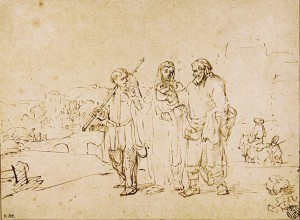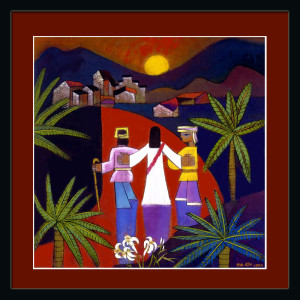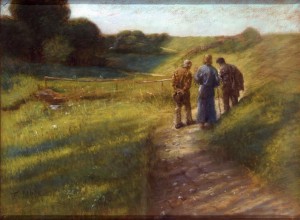a sermon on Luke 24:13-35
preached on April 3, 2016, at the First Presbyterian Church of Whitestone
There are a multitude of ways to spend time with people you enjoy. You might go to dinner and a movie—in a theater or in someone’s home. If you happen to live in New York City and have the budget for it, you might go see a Broadway show, a ballet, an opera, or some other cultural event. You might get together at someone’s house for a meal, some conversation, and maybe a game of some sort. And depending on your interests, you might go to a sporting event of some sort or wander around a museum together.
My two favorite options, though, are a little different. For me, there’s nothing quite like taking a walk or sharing a meal. The conversation that comes even in quiet as you wander the streets or parks of our city connects us with one another. Conversation flows, ideas are exchanged, and something special happens as we spend time together. Then, in those times when we sit at table together, we find a strange presence in our midst, as walls of division are broken down and the connection among those present deepens all the more.

Rembrandt?, The Walk to Emmaus
Maybe my appreciation of shared walks and meals with friends is rooted in our resurrection story from Luke this morning. The story of Easter morning that we heard last Sunday offers us a clear proclamation of the resurrection, but we never actually see Jesus alive again. The only evidence of the resurrection is an empty tomb, and that could be caused by so many things other than resurrection. So with the proof of this strange event limited to a missing body, Jesus’ disciples start to move on with their lives, scattering from Jerusalem in disbelief as they start to figure out what they will do without their beloved teacher and friend.
Two of them then set out on the road to the village Emmaus, a seven-mile journey from Jerusalem, easily reachable on foot in a somewhat leisurely afternoon journey. The conversation naturally turned to everything that they had experienced together over the last week—the triumphant arrival of Jesus into Jerusalem as the people cried out “Hosanna,” the challenging teachings that Jesus had offered in the temple, the Passover meal that they had shared, the arrest and trial of their friend, the chants of the crowd to “crucify him,” the sentence of death urged on by religious leaders and proclaimed by the Roman governor, the strange events at Golgotha as Jesus was crucified, the placement of his body in a simple, new tomb, and now the reports that his body had gone missing so quickly.
As they walked and talked, another man joined them on the road, joining in their surely animated conversation, asking them, “What are you discussing with each other while you walk along?” His question stopped them in their tracks as it all soaked in. Their journey with Jesus had begun somewhat unexpectedly as they stepped away from their families and homes and livelihoods because there was something compelling about his message. They had taken him seriously when he invited them—maybe even insisted to them—to set everything aside and follow him. Their worlds had been turned upside down by this journey, this message, this man. And now, after an eventful week, they found their world turned upside down once again because he was no longer with them. So this strange man’s question came as a real surprise. He forced them to take stock of their emotions and lives for the first time in light of everything that had happened—and they quite literally stopped in their tracks.
As they began to answer this stranger’s question and walk along together again, the disciples told this stranger about their friend Jesus, about their hopes for him, about the death that he had experienced, and about the empty tomb that the women had found that very morning. Even though the stranger said he had not heard anything about what had happened to Jesus, he soon began to explain everything that they had told him about, interpreting everything that had happened in light of the scriptures that they all knew so very well. The conversation flowed, and the disciples came to a deeper understanding of everything that they had experienced.
When the afternoon came to an end and the disciples reached their destination in Emmaus, the stranger “walked ahead as if he were going on.” But they were insistent:
Stay with us,
because it is almost evening
and the day is now nearly over.
Convinced by the logic of their argument and the lengthening shadows all around them, the stranger joined the disciples for the night. When they sat down at the table to share the evening meal, though, everything shifted once again. The guest became the host, blessing and breaking the bread, inviting them to share in a feast beyond their knowing. Suddenly the disciples recognized that the stranger who had been with them all afternoon was none other than the risen and living Jesus himself!
Just as quickly as they had recognized him, he vanished from their sight. They began to wonder and question and ask,“Were not our hearts burning within us while he was talking to us on the road, while he was opening the scriptures to us?” They immediately set out for Jerusalem again, ignoring their own advice to the stranger that it was too late to be traveling—their joy was too great, and they had to share this news with the other disciples! When they arrived there, they learned that Peter had also seen Jesus alive again, and “they told what had happened on the road, and how he had been made known to them in the breaking of the bread.”
This incredible, life-changing, world-shattering walk and meal marked a dramatic shift for the disciples as they went from skeptics to witnesses of the resurrection in the time it took for an afternoon walk and an evening meal. We can join in this walk, this meal, and this transformation for ourselves as we make our way through these Easter days.
First, we are invited to join the disciples in sharing the stories of our walks with Jesus in the journeys of our lives. We can bear witness to the ways that we have been changed by our encounters with the story of Jesus’ life and ministry as we walk with others along the way. We can talk with one another about how the experiences of Christ in our world have changed us and opened us to new and different ways of seeing and living in the world. And we can explore how the stories of Jesus’ life and ministry connect us with one another and with Christ as we walk this way together.
Then, we can gather at table for this meal as we look for the presence of Christ in our midst. We can open the doors to this feast wide so that all may know the kind of welcome that God offers here. We can come here expecting that Christ will meet us and be made known to us in the breaking of the bread, just as he was to the disciples on that first Easter evening. And we can trust that the feast we share here opens us to a great feast yet to come, to the feast on God’s holy mountain, “a feast of rich food, a feast of well- aged wines, of rich food filled with marrow, of well- aged wines strained clear.”
These journeys and these meals are then the openings for us of the deeper, broader, wider transformation of the world. Just like the disciples, our worlds are turned upside down by the journeys and the meals that show us the resurrection. We cannot meet the risen Christ along the road or at the table and be the same. We cannot claim the resurrection as our own and live as if Jesus’ death matters more than his new life. We cannot claim a meal of new life here at this table and live as if nothing has changed. And we cannot go forth into the world to hear and see and witness the resurrection for ourselves if all that we are looking for is life beyond death for ourselves.
So as we make our way to this strange and wonderful meal today, as we journey forth into the world to walk with one another and quite likely with Jesus himself, may we know the presence of the risen Christ among us so that we can be a part of his work of transformation in our world and as all things are being made new.
Christ is risen! He is risen indeed! Alleluia! Amen.

